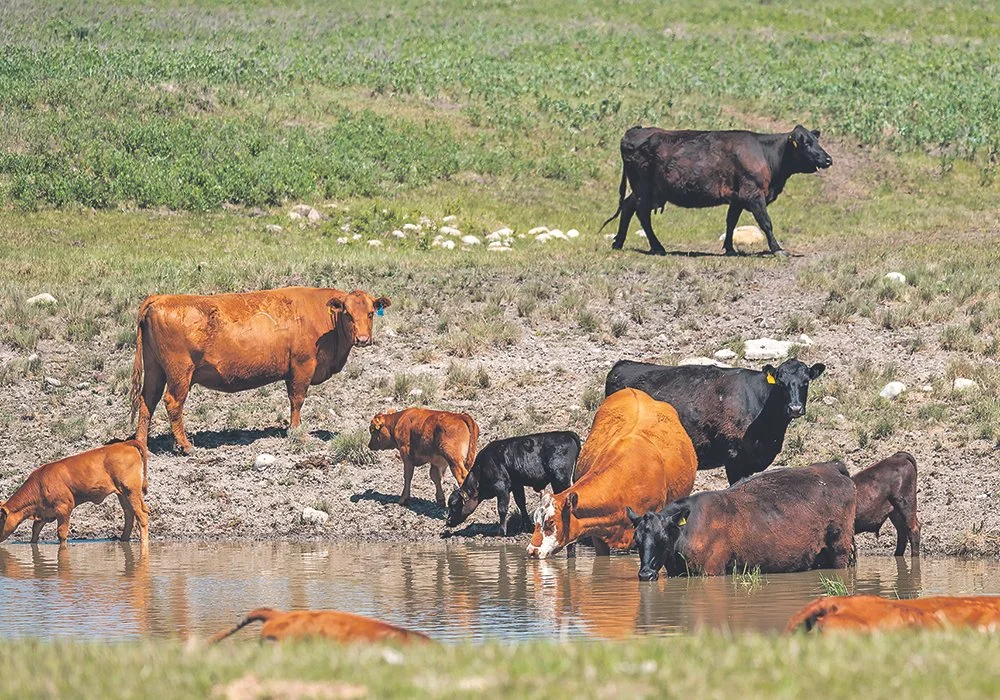Experts say the extent to which wildfires have burned across the province this year will have serious implications for the quality of B.C.’s watersheds and the ecosystems that rely on them. John Richardson, a Department of Forest and Conservation Sciences professor at the University of British Columbia, says with so many hillsides scorched by wildfires this year, there’s nothing to prevent incoming rain from creating a “debris torrent” — something which spells bad news for the province’s drinking water.
Cattle struggles deepen in Alberta
A second rural municipality in Alberta has declared an agricultural disaster because of drought this spring as beef producers head into summer, a period typically of less rain. “We haven’t seen the total effects of the drought,” said Stan Schulmeister, reeve of the County of Paintearth east of Red Deer. “But the agricultural producer that’s strictly dealing with livestock is going to find it very difficult to find feed this year because it’s almost province-wide, the damage to the hay crop and so on.”
As California faces droughts and floods together, farmers look to new water technologies
The earth under Dennis Lebow's gumboots is saturated. He's in the Salinas Valley in California, about an hour south of San Jose. The valley is often referred to as the "salad bowl of the world" as it's one of the most productive agricultural areas in the U.S. Most of Canada's lettuce, strawberries and tomatoes are grown in its fertile soil, according to California's Department of Food and Agriculture.
Producers experiencing water shortages in southwest Sask.
Farmers and other producers in southwest Saskatchewan are experiencing dry fall weather. The lack of rain in some areas is causing "moderate to severe on-site water shortages," according to the latest provincial crop report. "It's just setting us up again for a questionable start for next spring," Garner Deobald, the president of the Saskatchewan Stock Growers Association, said. Deobald said most places have seen below average snowfall for the last three or four years. He said the Ministry of Agriculture needs to monitor water quality.
Village of Roche Percee under boil-water order after E. coli bacteria discovered in water supply
Water testing in the village of Roche Percee has revealed E. coli contamination, and a boil-water order has been initiated, the provincial Ministry of Health said Friday The order is applicable for the entire community and other individuals who access water from Roche Percee, about 20 kilometres southeast of Estevan. "It's been an ongoing crisis here for a while," Mayor Jay Riedel said. "We've gone through a flood in 2011 when six to seven feet of water was here, which compromised a lot of stuff in this area. "Our water levels in wells are low and without the rain, when we need to keep them full, we're usually down at the bottom all the time."
Slow spring melt means Milk River farmers may avoid another summer of water shortages
Just under two months ago, Elise Walker was sure her farm near the Milk River would experience another summer of drought conditions. But with a cool, rainy spring now in the rearview, things are looking much different. The native prairie has a nice green tinge, she said, and the rain keeps coming. "It makes a huge difference, considering how dry we've been the past 12 months," she told the Calgary Eyeopener Monday.
From drought relief to filling streams, heavy rain proves beneficial in Sask.
This week's heavy rainfall in Saskatchewan might have felt a bit excessive, especially for those in areas that were already drenched, but it has helped significantly in regions that needed the moisture. Some communities in the province are already above their average June rainfall amounts. According to Environment and Climate Change Canada data, North Battleford sits at about 110 millimetres so far this month. The city usually receives 65 mm in the entire month. About 101 mm fell in the span of a few hours on Tuesday.
Liberal MLA for Abbotsford calls on province to help farmers restore properties, businesses
The Liberal MLA for Abbotsford South says the provincial government should be responsible for helping farmers in flood-stricken communities get back on their feet. Bruce Banman says the province failed to notify its residents, especially in floodplain areas like the Sumas Prairie, when an atmospheric river brought more than 200 millimetres of rain earlier this month. "This government was not paying attention to the Nooksack River at all and we lost 48 precious hours to be able to move equipment," Banman said on the CBC's The Early Edition.
Prairie farmers struggle as drought set to become among worst in Canadian history
Saskatchewan farmer Derek Tallon is harvesting one of the worst lentil crops he's ever grown. Like other farmers in the region, he watched his crops struggle to grow without much rain or reprieve from unrelenting heat during what one expert says is shaping up to be the worst drought in Canadian history. Tallon's farm in southern Saskatchewan only received about 50 millimetres of rain this year, compared to 190 millimetres during a normal year.
Southern regions of B.C. face worsening drought as another heat wave strikes
Recent rain on B.C.'s South Coast has not alleviated the region's worsening drought conditions, according to the provincial forest ministry. Most of the central and southern parts of the province are now facing drought after multiple weeks without consistent rainfall, leading to lower groundwater levels and warmer river temperatures. Though the South Coast had a temporary reprieve with scattered showers over the weekend, another punishing heat wave this week is expected to make the conditions worse.











